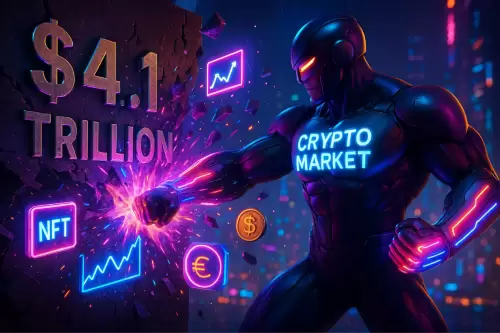 |
|
 |
|
 |
|
 |
|
 |
|
 |
|
 |
|
 |
|
 |
|
 |
|
 |
|
 |
|
 |
|
 |
|
 |
|
Cryptocurrency News Articles
Meta Spent $14.8B to Acquire Nearly Half of Scale AI's Equity
Jun 11, 2025 at 06:09 pm
On one hand, Meta spent $14.8 billion to acquire nearly half of Scale AI's equity, and the entire Silicon Valley was shocked that the giant repriced “data labeling” at a sky-high price

output: On one hand, Meta spent $14.8 billion to acquire nearly half of Scale AI’s equity, and the entire Silicon Valley was shocked that the giant repriced “data labeling” at a sky-high price; on the other hand, the upcoming TGE @SaharaLabsAI is still trapped under the Web3 AI bias label of “riding the concept and unable to prove itself”.
What is the market ignoring behind this huge contrast?
First of all, data labeling is a more valuable track than decentralized computing power aggregation.
The story of using idle GPUs to challenge cloud computing giants is indeed exciting, but computing power is essentially a standardized commodity, and the difference lies mainly in price and availability. The price advantage seems to be able to find a gap in the monopoly of giants, but availability is subject to geographical distribution, network latency, and insufficient user incentives. Once the giants reduce prices or increase supply, this advantage will be wiped out in an instant.
Data labeling is completely different - this is a differentiated field that requires human wisdom and professional judgment. Each high-quality label carries unique professional knowledge, cultural background, cognitive experience, etc., which cannot be “standardized” and replicated like GPU computing power.
An accurate cancer image diagnosis annotation requires the professional intuition of a senior oncologist; an experienced financial market sentiment analysis cannot be separated from the practical experience of a Wall Street trader. This natural scarcity and irreplaceability give “data annotation” a moat depth that computing power can never reach.
On June 10, Meta officially announced that it would acquire 49% of the shares of data labeling company Scale AI for $14.8 billion, which is the largest single investment in the AI field this year. What is more noteworthy is that Alexandr Wang, founder and CEO of Scale AI, will also serve as the head of Meta’s newly established “super intelligence” research laboratory.
The 25-year-old Chinese entrepreneur was a Stanford University dropout when he founded Scale AI in 2016. Today, the company he manages is valued at $30 billion. Scale AI’s client list is an “all-star lineup” in the AI industry: OpenAI, Tesla, Microsoft, the Department of Defense, etc. are all its long-term partners. The company specializes in providing high-quality data annotation services for AI model training and has more than 300,000 professionally trained annotators.
You see, while everyone is still arguing about whose model has a higher score, the real players have quietly shifted the battlefield to the data source.
A “secret war” for control of the future of AI has begun.
The success of Scale AI exposes an overlooked truth: computing power is no longer scarce, model architectures are becoming more homogenous, and the real upper limit of AI intelligence is the carefully “tuned” data. What Meta bought at a sky-high price was not an outsourcing company, but the “oil mining rights” of the AI era.
There is always a rebel in the story of Monopoly.
Just as cloud computing aggregation platforms attempt to subvert centralized cloud computing services, Sahara AI attempts to completely rewrite the value distribution rules of data annotation with blockchain. The fatal flaw of the traditional data annotation model is not a technical problem, but an incentive design problem.
A doctor may only get a few dozen dollars for a few hours of labeling medical images, while the AI models trained with these data are worth billions of dollars, but the doctor does not get a penny. This extremely unfair distribution of value has seriously suppressed the willingness to provide high-quality data.
With the catalysis of the web3 token incentive mechanism, they are no longer cheap data “migrant workers”, but real “shareholders” of the AI LLM network. Obviously, the advantage of web3 in transforming production relations is more suitable for data labeling scenarios than computing power.
Interestingly, Sahara AI happened to be in the TGE node of Meta acquired at a sky-high price. Is it a coincidence or a careful plan? In my opinion, this actually reflects a market inflection point: both Web3 AI and Web2 AI have gone from “volume computing power” to the crossroads of “volume data quality”.
While traditional giants use money to build data barriers, Web3 is using Tokenomics to build a larger “data democratization” experiment.
Disclaimer:info@kdj.com
The information provided is not trading advice. kdj.com does not assume any responsibility for any investments made based on the information provided in this article. Cryptocurrencies are highly volatile and it is highly recommended that you invest with caution after thorough research!
If you believe that the content used on this website infringes your copyright, please contact us immediately (info@kdj.com) and we will delete it promptly.






























































